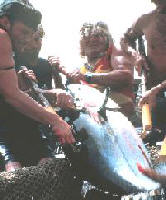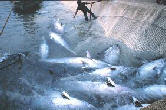|
With the largest fishing fleet in Europe, Spain is the largest beneficiary of subsidies, and subsidies for Spain are much larger than other countries' in proportion to the amount of fish it catches and the size and power of its fleet.
At the Fisheries Council, ministers are continuing to debate reform of the EU Common Fisheries policy, following Commission proposals outlined in April.
Also on the table are a plan released by the Commission Tuesday on reducing catches and discards of unwanted fish, as well as proposals for emergency action to safeguard stocks of cod and
hake in the light of scientific warnings of possible collapse in
numbers of these important commercial species.
On Wednesday, the Commission presented ideas to the EU fisheries
ministers for dealing with the cod crisis.
The Commission is
considering a strengthened recovery plan for cod, much stricter than
the one it proposed a year ago, as an alternative to a complete
moratorium on cod fishing.
|



